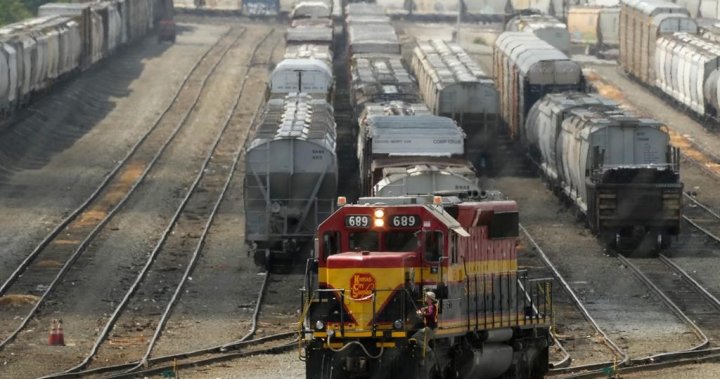Labour Minister Steve MacKinnon expressed that significant issues still exist in negotiations between Canada’s two main rail companies and unions, making a nationwide rail shutdown almost inevitable. The rail companies and union representatives have been at odds over scheduling issues and safety concerns, leading to a looming strike or lockout date for roughly 9,000 railway employees. The potential stoppage is concerning as it would disrupt supply chains not only within Canada but also across the continent, with support from allied rail workers in the U.S. Prime Minister Justin Trudeau and Deputy Prime Minister Chrystia Freeland have urged both sides to reach a deal to avoid the economic consequences of a shutdown.
MacKinnon emphasized that his role is to represent those who do not have a voice at the negotiation table, including business owners, workers, commuters, farmers, ranchers, and average consumers. He highlighted that the economic impact of a rail shutdown would be far-reaching, affecting everyday Canadians significantly. While the federal government has been urged to intervene, MacKinnon maintained that the best business deals are typically reached through negotiation and that the parties involved need to understand their responsibilities extend beyond their own interests. However, he did not commit to recalling Parliament before its scheduled return date to resolve the potential shutdown.
The Canadian Pacific Kansas City Ltd. network connects Canada to Mexico through the United States, meaning that a rail shutdown would have implications for North American supply chains as a whole. American rail unions, including the Brotherhood of Locomotive Engineers and Trainmen, have shown solidarity with Canadian Teamsters members by refusing to cross any physical picket lines. This stance means that American rail workers can decline to operate trains once they reach the Canadian border, impacting cross-border shipments. The U.S. Transportation Secretary, Pete Buttigieg, has been monitoring the negotiations and potential impacts on cross-border trade closely.
Despite suggestions that the trucking industry could fill the supply chain gaps left by a rail stoppage, representatives from both the U.S. and Canada have emphasized the limitations of this alternative. They cited ongoing labour shortages among truck drivers and the fact that one train is equivalent to about 300 trucks in terms of capacity. The Canadian Trucking Alliance president, Stephen Laskowski, noted that trucking can only assist in a limited way and that there is no real alternative to rail for transporting large and bulk items. Both U.S. and Canadian officials are closely watching the situation and recognizing the potential impacts across North America as negotiations continue.
In light of the ongoing negotiations and the looming rail shutdown, efforts are being made to encourage both parties to reach a resolution. The involvement of mediators and government officials, including the labour minister and transport minister, demonstrates a commitment to supporting a deal that benefits all parties involved. While concerns about the economic consequences of a railroad stoppage remain, there is hope that the imminent deadline and external pressure will spur momentum towards a resolution. The focus is on finding a compromise that addresses the concerns of workers, ensures safety standards are met, and maintains the flow of goods and services vital to the Canadian and North American economy.


